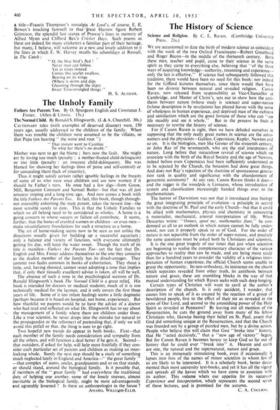The Unholy Family
Fathers Are Parents Too. By 0. Spurgeon English and Constance J. Foster. (Allen & Unwin. 15s.) The Normal Child. By Ronald S. lilingworth. (J. & A. Churchill. 30s.) CAUTIONARY tales (with examples of deserved disaster) were, 150 years ago, usually addressed to the children of the family. When there was trouble the children were assumed to be the villains, so that Papa (on hearing " the noise and rout ") That instant went- to Caroline To whip her there's no doubt."
Mother was next to get the blame ; hers now the fault. She might err by loving too much (penalty : a mother-fixated child-delinquent) or too little (penalty : an insecure child-delinquent). She was blamed for showing her feelings (loss of poise and self-control) or for concealing them (lack of sincerity).
Thus it might satisfy certain rather ignoble feelings in the breasts of some of us who were once children and are now women if it should be Father's turn. He once had a few digs—from Gosse, Mill, Benjamin Constant and Samuel Butler—but that was all just amateur sniping and a long time ago. And now comes a book with the title Fathers Are Parents Too. In fact, this book, though through- . out ostensibly exhorting the male parent, takes the newest line—the most sensible surely to date. This is that the Unholy Families to which we all belong need to be considered as wholes. A home is a going concern to whose success or failure all contribute: It seems, further, that the bones of crushed women or children—or even men— make unsatisfactory foundations for such a structure as a home.
The art of home-making seems now to be seen as not unlike the directions usually given for building up a successful aquarium ; only a balance and variety of function, with everyone ultimately getting his due, will keep the water sweet. Though the truth of its title is manifest—Fathers Are Parents Too—yet the fact that Dr. English and Mrs. Foster address themselves to the one they conceive as the deafest member of the family has its disadvantages. They commit two faults common in books of exhortation. They shout a little, and, having shouted, cannot resist adopting a tone that implies that, if only their (Usually excellent) advice is taken, all will be well.
The absence of such a tone in the psychological sections of Dr.
Ronald Illingworth's book The Normal Child is a great relief, His book is intended for doctors or medical students, much of it is too technically medical for the layman, and it only covers the first three years of life. Some of it (on infant feeding) seems a little dogmatic (perhaps because it is based on hospital, not home, experience). But how thankful we pa cents would be to have the advice of a doctor who had read and reflected on what Dr. Illingworth has to say about the management of a family where there are children under three. Like a true scientist, he never drops into the mistake (so natural to the propagandist or the reformer) of pretending that, if only we will avoid this pitfall or that, the thing is sure to go right.
Two hopeful new trends do appear in both books. First—that each member of the family needs consideration and sympathy from all the others, and will function a deal better if he gets it. Second— that outsiders, if asked for help, will help most fruitfully if they con- sider each particular set of parents and children as making an inter- locking whole. Surely the next step should be a study of something much neglected lately in England and America—" the great family " —that complex of aunts, uncles, grandparents and so on that stands, or should stand, around the biological family. Is it possible that, if members of the " great family " had everywhere the traditional duty of helping one another, some of the lonely stresses, almost inevitable in the biological family, might be most advantageously and agreeably lessened ? Is there an anthropologist in the house ?
AMABEL WIELLWS-ELLIS.


































 Previous page
Previous page